
Boletin Antropologico
Scope & Guideline
Delving Deep into Social Structures and Cultural Practices
Introduction
Aims and Scopes
- Cultural Anthropology:
Exploration of cultural practices, beliefs, and identities, particularly in Latin America, emphasizing the complexities of ethnic identity, cultural tourism, and the impact of globalization. - Archaeology and Historical Analysis:
Investigation of archaeological sites and historical narratives to understand human development, social structures, and cultural heritage, with a focus on pre-Hispanic and colonial contexts. - Social Issues and Activism:
Examination of contemporary social issues, including migration, indigenous rights, and the role of women, often through the lens of activism and social justice. - Methodological Innovations:
Adoption of diverse methodologies, including ethnoarchaeology, morphometry, and digital anthropology, to address complex anthropological questions. - Interdisciplinary Approaches:
Integration of perspectives from other disciplines, such as history, sociology, and feminist studies, to enrich anthropological discourse and analysis.
Trending and Emerging
- Indigenous Rights and Activism:
A rising trend in exploring the role of indigenous organizations and movements, particularly in the context of digital activism, highlights the importance of indigenous voices in contemporary anthropological discourse. - Gender Studies and Feminist Perspectives:
There is an increasing emphasis on gender issues, particularly the role of women in various cultures, and feminist critiques within anthropology, showcasing a commitment to examining power dynamics and social inequalities. - Impact of Technology on Society:
Recent articles address the implications of digital technology and social media on cultural identities and community organization, reflecting the journal's engagement with modern societal transformations. - Health and Illness Narratives:
The exploration of health issues, particularly in relation to non-Western epistemologies and the COVID-19 pandemic, indicates a growing interest in the anthropology of health and illness as it pertains to cultural contexts. - Environmental Anthropology:
Emerging discussions on environmental issues and sustainability reflect a trend towards understanding human-environment interactions, especially in the context of climate change and its social implications.
Declining or Waning
- Traditional Archaeological Practices:
There is a noticeable decline in papers focusing solely on traditional archaeological methods without interdisciplinary approaches, as the journal increasingly prioritizes innovative methodologies that integrate cultural perspectives. - Focus on Western-centric Anthropology:
The prominence of studies centered on Western anthropological theories appears to be waning, with a shift towards more localized and indigenous perspectives that challenge Eurocentric narratives. - Studies on Ancient Civilizations without Contemporary Relevance:
Research that does not draw connections between ancient civilizations and contemporary social issues seems to be decreasing, as the journal emphasizes the relevance of historical studies to current cultural and social contexts. - Generalized Ethnographic Studies:
The journal seems to be moving away from broad ethnographic studies that lack specific focus or local context, favoring more targeted research that addresses specific communities or issues.
Similar Journals
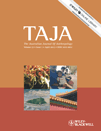
Australian Journal of Anthropology
Unveiling Social Dynamics Through ResearchThe Australian Journal of Anthropology, published by Wiley, stands as a pivotal resource in the field of anthropology, reflecting a deep commitment to advancing scholarly discourse since its inception in 1990. With an ISSN of 1035-8811 and E-ISSN 1757-6547, this journal provides a platform for innovative research and critical analysis, contributing to the global anthropology community. Based in the United States, at 111 River St, Hoboken, NJ, it has established itself in the Q3 category of anthropology journals, ranking #162 out of 502 in Scopus, placing it in the 67th percentile among its peers. While it is not currently an open-access publication, the journal remains dedicated to accessibility through institutional subscriptions and provides a wealth of insight into anthropological methods and cultural studies. It seeks to foster interdisciplinary dialogue and promote a comprehensive understanding of social dynamics, making it an essential read for researchers, professionals, and students eager to enrich their knowledge and engage with contemporary anthropological issues.
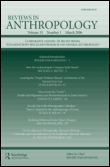
Reviews in Anthropology
Bridging Cultures through Scholarly ReviewsReviews in Anthropology, published by Routledge Journals, Taylor & Francis Ltd, is a vital academic journal for scholars and practitioners in the fields of anthropology and cultural studies. With a history extending from 1974 to 2024, this journal reflects the evolving discourse within the social sciences, offering a collection of insightful reviews and critiques that shape contemporary anthropological thought. Although it operates under a non-open access model, its impact is underscored by its positioning in the Q3 quartile for both Anthropology and Cultural Studies, as well as respectable Scopus rankings. This journal serves as a platform for disseminating influential research, fostering academic dialogue, and enhancing understanding of diverse cultures and societies. Its robust editorial board and commitment to quality scholarship make it an essential resource for researchers, professionals, and students looking to deepen their knowledge and contribute to the ever-changing landscape of anthropology.

Anthropology Today
Transforming Understanding through Rigorous ResearchAnthropology Today, published by WILEY, is a leading peer-reviewed journal in the field of anthropology, boasting a distinguished Q1 category ranking in the 2023 evaluations and a notable position within the top 79th percentile of its discipline according to Scopus. Established in the United States, this journal offers a rich compendium of contemporary anthropological research, covering diverse topics that shape the understanding of human cultures and societies. It is recognized for its rigorous academic standards and commitment to publishing innovative studies that reflect current trends and discussions within the field. While the journal is not open access, it provides insightful articles and reviews that are indispensable for researchers, professionals, and students seeking to enhance their knowledge and stay updated with the latest anthropological findings and theoretical advancements.

Revista Espanola de Antropologia Americana
Illuminating the Dynamics of American AnthropologyRevista Española de Antropología Americana, published by UNIV COMPLUTENSE MADRID, SERVICIO PUBLICACIONES, stands as a significant contribution to the field of anthropology, particularly focusing on American societies and cultures. Since its inception in 1970, this journal has evolved, with issues currently being published until 2024, providing a platform for original research, reviews, and scholarly discourse. Despite being a Q3 category journal in the 2023 rankings, it plays a pivotal role in disseminating knowledge and stimulating academic debate within the anthropology community. With an ISSN of 0556-6533 and an E-ISSN of 1988-2718, Revista Española de Antropología Americana strives to engage researchers, professionals, and students with insightful content that reflects the dynamic nature of cultural studies. Although it operates under traditional access models, the rich array of topics covered ensures its relevance to ongoing scholarly conversation in social sciences and anthropology. Addressing a diverse array of anthropological themes, this journal is essential for anyone looking to deepen their understanding of the cultural frameworks shaping American societies.
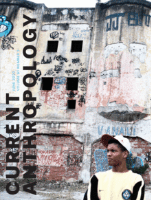
CURRENT ANTHROPOLOGY
Elevating Knowledge in Anthropology Since 1962CURRENT ANTHROPOLOGY, published by the esteemed University of Chicago Press, stands as a premier journal in the fields of anthropology and archaeology, with an impressive impact factor that signifies its relevance and authority in the academic community. With both print (ISSN: 0011-3204) and digital formats (E-ISSN: 1537-5382), this journal provides a platform for groundbreaking research, theoretical advancements, and critical discussions that shape our understanding of human cultures and societies. Since its inception in 1962, CURRENT ANTHROPOLOGY has continually pushed the boundaries of knowledge and inquiry, earning a prestigious Q1 ranking in 2023 across multiple categories, including Social Sciences and Archaeology. Researchers and professionals alike rely on this journal not only for its rigorous peer-reviewed articles but also for its commitment to interdisciplinary approaches and innovative methodologies. While not currently offering open access, CURRENT ANTHROPOLOGY remains an essential resource for students and scholars eager to stay abreast of the latest developments in anthropological research.

Virajes-Revista de Antropologia y Sociologia
Unlocking Insights into Latin American Social DynamicsVirajes-Revista de Antropologia y Sociologia, published by UNIV CALDAS, is a premier open-access journal that has been at the forefront of anthropological and sociological research since its inception in 2008. With the ISSN 0123-4471 and the E-ISSN 2462-9782, this journal offers a unique platform for scholars and practitioners to disseminate high-quality research that contributes to the understanding of social dynamics and cultural phenomena, particularly in the Latin American context. The journal seeks to foster an interdisciplinary approach, bridging theoretical and empirical research, and encouraging critical dialogues on contemporary issues in anthropology and sociology. By providing open access, Virajes ensures that its valuable content is available to a global audience, thus enhancing knowledge dissemination and engagement within the academic community. With its commitment to excellence and accessibility, Virajes stands as an essential resource for researchers, professionals, and students committed to exploring the complexities of human societies.

Cahiers des Ameriques Latines
Navigating the Intersections of Culture, Society, and Politics in Latin AmericaCahiers des Ameriques Latines is a distinguished academic journal published by the Institut des Hautes Etudes en Amérique Latine, based in Paris, France. Since its inception, this journal has been at the forefront of Cultural Studies, Urban Studies, Sociology, and Political Science, providing a critical platform for scholarly discourse on Latin American issues. With an open access policy implemented in 2008, it reaches a diverse and global readership, facilitating knowledge-sharing among researchers, professionals, and students alike. The journal has notably earned a recognition of Q2 in Cultural Studies and has been actively contributing to academic discussions since its converged years from 1972 onward, presently catering to themes relevant until 2024. Despite its varying rankings across categories, including placements in Demography and Urban Studies, Cahiers des Ameriques Latines remains essential for anyone looking to deepen their understanding of the complex social and cultural dynamics within Latin America.

INTERNATIONAL JOURNAL OF AFRICAN HISTORICAL STUDIES
Connecting Cultures through Rigorous Historical InquiryInternational Journal of African Historical Studies is a leading academic journal published by the African Studies Center at Boston University. With its ISSN 0361-7882 and E-ISSN 2326-3016, this journal serves as a vital platform for scholarly discourse in the fields of History, Cultural Studies, and Sociology. Renowned for its rigorous peer-reviewed research, the journal holds a commendable Q1 ranking in History and Q2 in Cultural Studies as of 2023, highlighting its influence and contribution to African historical scholarship. The journal has been published since 1976, consistently providing insightful analyses and critical research that engage with Africa's past and present, thereby enriching our understanding of global histories. Although it does not offer an open-access model, the journal is accessible through various academic databases and institutions. Its mission is to foster a deeper understanding of African histories by publishing high-quality, innovative research that reflects diverse perspectives, making it an essential resource for researchers, professionals, and students dedicated to the study of African history and cultural dynamics.
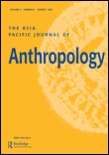
Asia Pacific Journal of Anthropology
Fostering Dialogue on Asia Pacific AnthropologyAsia Pacific Journal of Anthropology is a premier academic journal dedicated to advancing the field of anthropology and cultural studies, published by Routledge Journals, Taylor & Francis Ltd. With an ISSN of 1444-2213 and E-ISSN 1740-9314, this journal has gained recognition for its rigorous scholarly contributions since its inception in 2000. Situated in the UK, it is strategically positioned to serve as a vital resource for researchers, professionals, and students exploring the rich complexities of human societies and cultures within the Asia Pacific region and beyond. As evidenced by its Q2 ranking in both anthropology and cultural studies for 2023, alongside its impressive Scopus ranks—#218 among 1304 in Cultural Studies and #157 among 502 in Anthropology—this journal illustrates a strong commitment to delivering high-quality, impactful research. While it is not an open-access journal, it remains a key platform for disseminating innovative research and fostering academic dialogue, thereby significantly contributing to the advancement of knowledge in the social sciences.
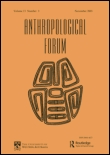
Anthropological Forum
Cultivating Scholarly Excellence Since 1963Anthropological Forum, an esteemed journal in the field of anthropology, is published by Routledge Journals, Taylor & Francis Ltd. With an ISSN of 0066-4677 and an E-ISSN of 1469-2902, the journal has cemented its reputation for fostering critical discussions and innovative research since its inception in 1963. Covering a broad range of topics within anthropology, it has achieved an impressive Q1 ranking in the category of Anthropology and a Q2 ranking in Arts and Humanities (miscellaneous) in 2023, showcasing its pivotal role in advancing scholarly discourse. With a Scopus ranking placing it in the top 10% of its field, the journal provides valuable insights into contemporary anthropological issues, making it an essential resource for researchers, professionals, and students alike. Although not an open-access journal, the comprehensive studies and articles published within its pages contribute significantly to the academic and professional community. Addressed out of Milton Park, Abingdon, UK, the Anthropological Forum remains a seminal platform for disseminating high-quality anthropological research.